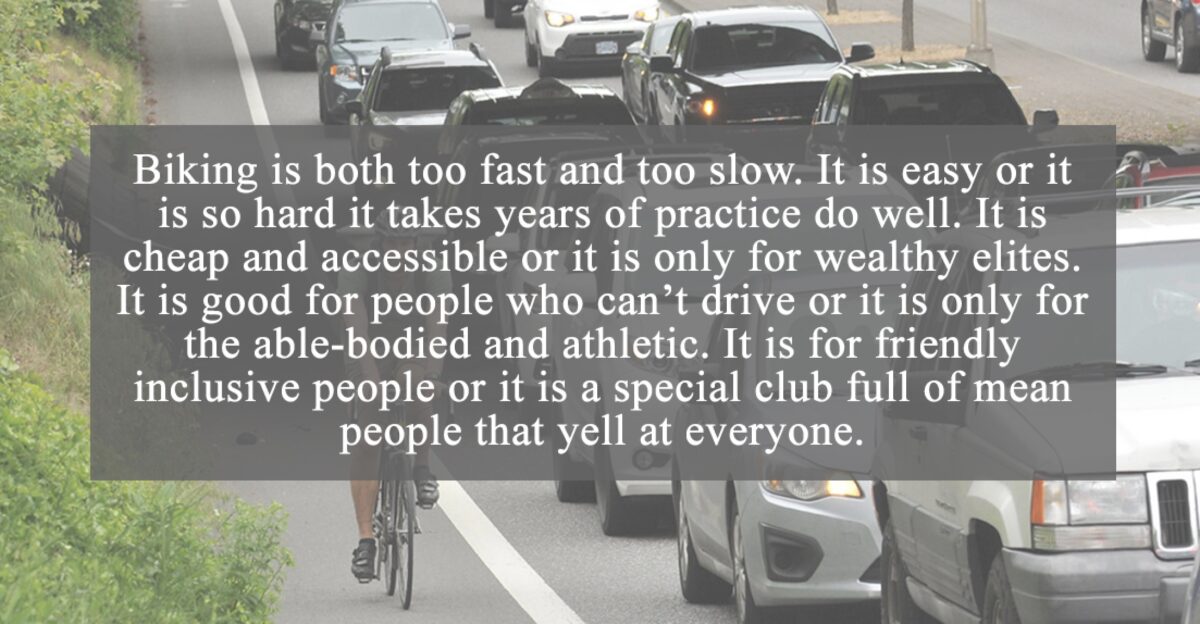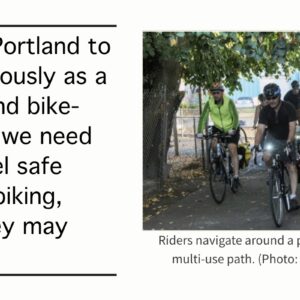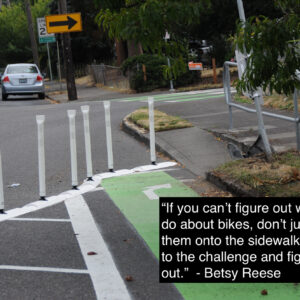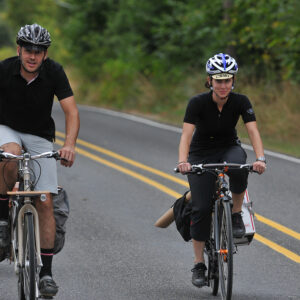Given the robust discussion about our comment section last week, I figured it was time to bring back “Comment of the Week” as a more regular feature. This is where we take a look at a previous week of comments and highlight a particularly good and/or notable one.
In the past I’ve used this to model good commenting behavior. But sometimes I think a comment is just plain interesting and deserves a wider audience. This is one of those times.
The comment comes from reader SD and it was written in response to Monday’s story on the gravel mess left in many bikeways after the storm:
“Trash, snow and gravel in the bike lanes is a poignant representation of the strengths and perceived weaknesses of biking. Gravel can’t be left on the street because a windshield might be chipped and drivers will complain, it can’t be swept onto the sidewalk (usually), so “let’s pile it in the bike lane.” Bike riders can be flexible and either take on the dangerous conditions, drive or walk. Similarly, biking, in general, exists in this middle space where it can be ignored or trashed depending on the mood or time of day.
Advertisement
Biking is both too fast and too slow. It is easy or it is so hard it takes years of practice to do well. It is cheap and accessible or it is only for wealthy elites. It is good for people who can’t drive or it is only for the able-bodied and athletic. It is for friendly inclusive people or it is a special club full of mean people that yell at everyone. Bike infrastructure is too expensive but not expensive enough for DOTs to be interested. It is an equalizer across socioeconomic groups or it only furthers the desires of old white males. Bike infra increases revenue for businesses or it kills them. It energizes wannabe progressive politicians, but they can’t be initiated into a career of public service until they murder a bike lane. It builds community or it divides us all. It energizes a grass roots base or it sucks all of the oxygen out of the room and we should stop talking about it. Bike use is increasing on it’s own and doesn’t need prioritization or it is decreasing and should be abandoned by cities as a mode of transport. Bike riding is an environmentally sustainable transportation mode, but somehow causes cars to idle, which increases pollution. It is safer than driving, but it is so dangerous that we need public campaigns to constantly remind people to ride safely. Bike riders are invisible, but they are everywhere and always in my way. The bike lobby is all powerful and too loud, if only they advocated enough for themselves, city hall would be able to help them.
Also, biking is adaptable enough to be squeezed into existing infrastructure without resources because bike riders can be car drivers, bike riders and pedestrians all at the same time. So, if a person wants a safe place to bike they should file a complaint every time something needs to be fixed, and they should stop complaining all the time, because it’s not all about them.”
SD gets to so many of the tricky dichotomies that plague bicycling in Portland (and America). As you read it, ask yourself: Why do these contradictions exist?
Thanks for the comment SD. You’ve got a prize pack on the way.
I’ll try to do this every Tuesday from here on out. You can help me find good ones by replying with “comment of the week” to any comment you think deserves attention.
(DISCLAIMER: This comment does not necessarily reflect the personal opinion of Jonathan Maus or BikePortland.)
— Jonathan Maus: (503) 706-8804, @jonathan_maus on Twitter and jonathan@bikeportland.org
— Get our headlines delivered to your inbox.
— Support this independent community media outlet with a one-time contribution or monthly subscription.








Thanks for reading.
BikePortland has served this community with independent community journalism since 2005. We rely on subscriptions from readers like you to survive. Your financial support is vital in keeping this valuable resource alive and well.
Please subscribe today to strengthen and expand our work.
Love this!!! It really captures it.
You must be riding to lose weight / you’re too fat to bike is another fun one.
I first became aware of a really big gap in bicycle infrastructure perception when a lady from L.A. said neighborhood greenways had neighbors in an uproar because they would bring crime. That was the same time the Albina neighborhood was up in arms about proposed greenways bringing gentrification.
Thanks, SD!
Such a great comment! I’d say all those stories exist based on our preconceived notions of who is making the case. I felt the same conflciting stories around 7th. I was either an evil gentrifier trying to wall off black folks from the neighborhoods with diverters, who as Jonathan incorrectly reported, stormed out of a meeting after the greenway announcement. Or I was a brand new father trying to make the neighborhood safe for my daughter and all other vulnerable road users. In the end I do not think the ice cream socials, block parties, talking with black leaders, community bike rides or knocking on doors mattered one bit. It was a politcal decision.
What I discovered was the power that PBOT has to set the narrative. We may think we have some power to influence things through bikeportland or twitter, and we certainly do compared to the advocates from the 90s, but we are no match for the force of an organization as big and with as much money to spend as PBOT. When PBOT presents the case that bike lanes on Hawthorne are bad for equity and climate it is hard to disagree.
That is why I hope we get some stronger advisory committees at PBOT which can provide more accountability. Also, a well financed and led advocacy group could also set a narrative (like they did in NYC today).
Maybe there is some political interference which isn’t showing up in the media? There’s probably no written record of it but I get the impression that staff are being told in no uncertain terms that they had better come up with a specific decision and make it look good. It could simply be that there’s some chance alignment of institutional incompetence, or institutional malice. All of these projects are being spearheaded by the paving division. A manager literally said to me “bikes don’t pay for roads” — and they think cars do! Definitely a systemic problem here.
My bike as a job and a drivers license, and with the amount of driving it does, it certainly pays plenty of gas tax. Meanwhile, my car isn’t even trying to find work; it mostly watches TV all day and has probably been a net drain on society for the past several years.
It sounds like no matter what your intent, others saw you in a way they wanted to see you. I hope that both conservatives and liberals can take this to heart when seeing others.
They look (for other cars) but they don’t see (anyone other than other car drivers.) They hear you, but they are not listening. They work in the public interest but they are nameless faceless bureaucrats at taxpayer expense. They recognize that you can vote, but they figure you probably didn’t.
As I recall, the dichotomy was that an economically-comfortable white person living in what was once a predominantly black community aggressively pursued infrastructure that would have made it more difficult for displaced black people to access essential resources and cultural institutions. Not so much gentrification — that tragedy has already happened — but rather rubbing salt in the wounds of people who have been enormously harmed by the exclusionary racism of market urbanism.
So it’s best to not paint bike lanes? The housing market is a mess, no bike lanes! Got it.
Apparently, this is a video of what an “aggressive” pursuit of safer streets looks like https://www.youtube.com/watch?v=83r22ZRZM14
Kiel, Just to be clear I did not mean “aggressive” as a pejorative. I believe advocacy for transportation alternatives should be more aggressive than it is now. In hind sight, one of the primary flaws of the NE 7th campaign was that grassroots activists pushing for greater change were not representative of the community as a whole# and that this provoked understandable push back given PBOT mistakes and Portland’s racist history in this neighborhood.
Jonathan Maus is also correct that this was in the context of an enormous failure by PBOT to reach out to black community members (again, FFS). However, when PBOT screws up it has power, funding, staffing, connections, and a history of relationships with the community that allows for damage control. Grassroots activism typically lacks experience/staff, resources, and connections so is at a natural disadvantage (see the bolded part above for what to do about this.)
And anyone engaging in grassroots activism in Portland should absolutely expect to be thrown under the bus by city bureaus/staff if it serves their interests.
#white privilege
Thanks, I agree with everything you said. Wish I had understood that this project was already dead before I started thinking that it could happen. Portland has stretched the limits of what grassroots organizing can accomplish. We very much need bigger groups that have resources to be more representative.
I hope we can learn from these experiences and build new ways of advocacy so no one gets left under the bus.
So white it could be Asheville, Portland, Pittsburgh or any other overwhelmingly white middle-class hippy community where most of the visible minorities live elsewhere in the slummy parts of town. The video shows a block party – I fail to see any sort of transportation activism shown. How was the historically black church up the street participating? How were long-time local businesses involved? Did you already get a city permit to have a block party or was this impromptu? How did local car drivers react to having the street blocked off? Were any of the upset drivers driving while Black, Latinx, or poor?
What worked for us in East Portland, at least while I was involved (2009-15) was that we went out of our way to get transportation advocacy buy-in by the 13 neighborhood associations (mostly white and generally elderly), local business associations (white and middle-aged), churches (various races and denominations), school districts (East Portland has 5 different ones, each with over 99 languages spoken), ethnic immigrant associations, numerous public agencies (of which PBOT was one of over 20), interested but concerned neighbors, the local bike community (all 15 of them), and the local media. We also worked in alliance with groups like SWNI that technically have nothing to do with East Portland.
When we found ourselves being “thrown under the bus” as Soren correctly puts it, we often found that we were in fact making great progress with several public agencies, so if PBOT doesn’t like us, ODOT actually gets really friendly and helpful, and vice versa. PBOT is not a monolithic organization, but a mess of smaller units that don’t talk with one another, so if PBOT planning gave us grief, we went and talked with engineering instead, or with the budget people, or with signals, and so on – there are so many buttons to push, and only through a coalition can you possibly push them.
And when everyone was ignoring us, we gave a good story to the trashy media, the Portland Tribune among others. There’s nothing like bad publicity to spur bureaucrats and politicians along.
Wow, that video. It really does feel like Portland just pulls out the people of color when they need them, then it’s back to party time.
RE: 7th ave stuff… I never thought Kiel was all that “aggressive”. I think his zeal for the changes might have gotten the better of him, which is a reasonable and excusable mistake to make in my opinion (ask me how I know so much about this topic!).
I think it’s worth remembering the timeline a bit. Let’s not forget that it was PBOT that came into this project with some very amazing and major designs and was super confident they would be loved by all… And they were loved by many… But not all. PBOT then realized when it was too late that they made essentially the exact mistake they make years earlier on Williams. They forgot to go directly to Black residents and talk to them about the changes in general, before mocking up specific designs.
I love my friends at PBOT, but they set this up from the start.
7th is a de facto bike / green way based on my own observations of other riders and personal use. We can sometimes make it our own regardless of the official designation through numbers and frequency / use. The new speed bumps did help tremendously, in keeping vehicle speeds down. Hopefully your efforts had something to do with their installation. Bravo.
Wow, I’m kind of in awe. That really sums up the dichotomies (some real, others false) that confront us. Well done.
To me, there is something more than just well-articulated dichotomies here. This is also capturing contradictions in people’s opinions.
Perhaps most significantly, though, it shows by elucidation that so many people simply just do not get bicycling.
Wow, such a thought provoking comment certainly worthy of a prize thanks for reposting it!
a bike is a tool to get around – it really shouldn’t be more complicated than that
This highlights how Portland isn’t a uniform city like we think it is. When I first moved here, I lived west of Caesar Chavez and it seemed like everyone around me was well educated, from another city, rode bikes and didn’t have a car, ate organic food, volunteered, lived with roommates, was communal, had desk jobs. I now live just west of 82nd and I don’t think this anymore, quite opposite actually.
Wait until you try going EAST of 82nd…
You should try living east of I-205. An even bigger eye opener on just how non-uniform Portland is.
This is a great comment, but I think it’s even more than that. I see it as a perfect illustration of how flexible our logic becomes when we try to wrap our heads around complicated subjects that are important to us. Well done!
I’d go one step further. Our logic becomes flexible when it comes to justifying our own behaviors but judging the behavior of others.
Their trips in the car are not important, but mine are.
This is simply brilliant!
This dichotomy becomes simple when we decide to look at it from a long vs short term view. When we only focus on the here-and-now these many views become possible and likely. But when we focus ( in a realistic way) on the long term ,the fog clears away. Once we drop away the techno-utopian fantasies, and look at what is possible and what can be sustained then there no longer any questions. For personal transportation the bike ( and its older cousin walking) reign supreme.Once we accept what is possible and separate it from from our wants and desires the efficiency, simplicity and sustainability of bicycle transportation will win out and its detractors will be buried in the sands of history.
SD has had some good comments on here, but my fave is their take on the Gideon Pedestrian Bridge:
“…I think you are one of the few commenters that is surprised to find out that Trimet proposed something substantial, but scaled it back to a compromised piece of bike/ pedestrian infrastructure that will be painfully underutilized. It may seem upsetting and startling, but this sad, sad story is older than “old Portland.”
The narrative structure of all transportation projects in Portland is something like a greek tragedy, except that the flawed protagonists walk away at the end without a scratch, ready to do it all over again.
The Portland Metro Transportation Tragedy in 3 acts.
1. Progressive Utopia: The flawed protagonist, a transportation agency filled with a mix of dreamers and crusty bureaucrats finds a pot of money for a transportation project. In this case, a bridge for trains and buses across the Willamette. Excited about their riches and wanting everyone on their side, they greenwash the hell out of the project, and over promise on design that will bolster bike/ ped/ community building/ place making/ and more recently, social justice so that the elected officials can have endless photo ops and get green cred.
2. Bait and Switch: During planning, they start to scale back the design by cutting bike and pedestrian infrastructure due to “cost” or “feasibility” but more likely falls under the category of not caring and thinking of bike ped as out of their purview. With TriMet this act also includes the comedic relief of hiring engineers who don’t know how to design bike infra and are happy just to slap some crazy maze of sidewalks, arrows and lights together and call it good. (Typically, a montage set to Yakety Sax). In general, no one with authority cares unless a car is slowed down or there is the perception of a car being slowed down. (Like the foreshadowing?) Finally, the implementation of a watered down, indirect, incremental, confusing piece of bike infrastructure is within sight as the biking community cheers “Yeah, I guess that’s better than nothing.” But then, Act III.
3. NIMBY Rage: Everyones favorite classics, like “No one ever told me,” “Rammed down our throats,” “Think of little little businesses.” “Someone will get hurt.” “I’m a cyclist too.” “Gentrification, I don’t know what it means but it makes people shut up.” “I saw a cyclist run a stop sign!” At this stage, there are cameos by the various actors like the PBA, B list legislators, and maybe an expert on urban transportation like a taco or gelato mogul, or a theater owner. The drama is once again at its height, although everyone is exhausted because it has already gone on way too long. And the it ends with everyone singing the Portland city hall’s national anthem “Let’s compromise on the compromises that we compromised everything to achieve because compromising is hard and something about sausage and middle ground and sharrows.”
Its actually pretty boring after you’ve seen it a few times, but the hook, the reason everyone keeps coming back is because you never know if anything is ever going to be built until curtains. Nothing could be built, something great could be built, but usually something that is a little more than nothing, that is strange and wonderful like a bonsai tree of broken dreams takes its place in the Portland landscape.”
Oy vey; it just comes down to 3 things: Ride your bike. Enjoy riding your bike. Once in awhile do something that helps someone else enjoy riding their bike too.
The dichotomies are real for a very simple reason. People ride for all kinds of reasons, so there’s no real basis to expect a strong thread tying things together.
If there is a common thread, it’s that self described cyclists are more cliquish than most people, and what is broadly referred to as cycling actually refers to a bunch of subcultures that not only don’t have much in common, but don’t even like each other 😉